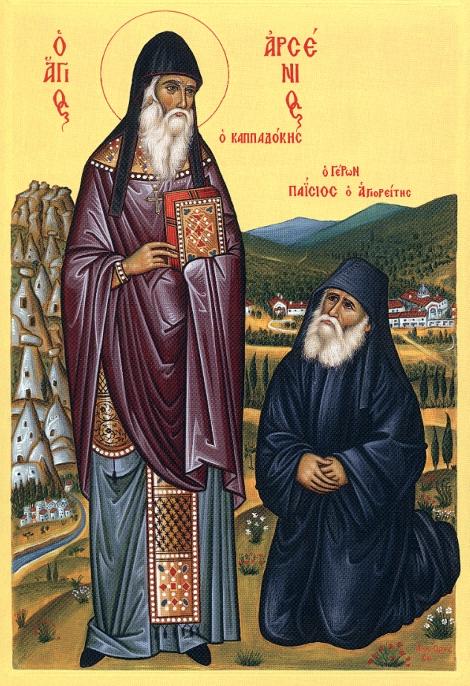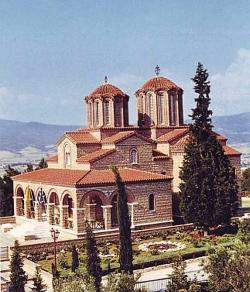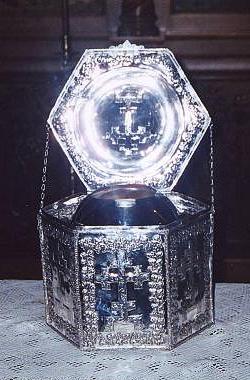The life of Saint Arsenios the Cappadocian – 3
16 November 2017All the Pharasiotes began their preparations at once, just as Father Arsenios did. First he baptised all the unbaptised children, including the village president’s child, at which time the following event occurred: The child’s parents wanted to give him the grandfather’s name, Christos.
Father Arsenios, however, did not agree, because he wanted to give him his own name, and he said to the parents:
“It’s natural that you should want to have someone follow in the grandfather’s footsteps, is it not also natural for me to want to leave a monk to follow in mine?”
He then turned to the godmother and told her: “Arsenios is the name you will give him.”

Indeed, from an early age, this child did aspire to become a monk, and in fact became one. Whether it was Father Arsenios’ prayer that took effect, or his gift of foresight, both alternatives reveal the holiness of the person.
After the baptism of the children, Father Arsenios was digging for a week in order to hide the sacred vessels so that they would not be desecrated by the Turks. He placed some in the Church of the Blessed Martyrs Varachesios and lonas, and others in the cemetery. It was, of course, impossible to take them on the journey, because the animals were loaded down with small children in cases of twos, or with the elderly, with foodstuffs and other urgent supplies for the long march.
Just as the affectionate Father Arsenios, who was very caring, looked after the arrangements for his children, so the children, out of philotimo, also made sure that he was afforded some relief, even if only bodily, in that wretched exile of theirs. For this reason they prepared a gentle beast of burden, to carry him and keep him from getting overly tired, but in no way did he agree to ride on it. Then the Council was forced to appoint three strong, pious young men to accompany him, Moisis Koglanidis, Khoutis’ son, Solomon Koskeridis and Sarantis Tsopouridis, even though Father Arsenios had no need of human protection. He was spiritually a stout-hearted young man himself and possessed divine powers, as would become clear from what happened during the course of the journey.
The flight began on 14 August, 1924, since the Turks had come earlier and evicted them from their homes. The Feast of the Dormition of the Theotokos (15 August), was being celebrated in the first village they stopped at, Ahyiavoudes (Yahyali).
Father Arsenios, like the good shepherd, kept close to his fleeing flock. Despite the fact that an exchange of populations was taking place, the Turks still behaved like angry hornets, as always.
From Ahyiavoudes, Father Arsenios returned to Pharasa on foot, sixty kilometres all total, (thirty there and thirty back), to fetch the holy Relic of Saint John Chrysostom, which he had forgotten, from the altar of the Church of Saints Varachesios and Ionas. He went on this trip without taking any of his companions with him, so as not to tire them. He then returned to his flock, who were anxiously waiting for him.
In Ahyiavoudes, the Turkish authorities gave him a gendarme for his protection, to look after him and to hand him over alive in Nigde. And so, while they were walking from Enehil to Oulagac, they came across an enraged Turk on horseback, who said to the gendarme:
“What do you want with him (he meant Father Arsenios), and why don’t you throw him somewhere and be done with him?”
One of the three young men became frightened that they might harm Father Arsenios, and told him to tell these Turks that he was an official person and that they had better be careful. Father Arsenios answered him, “Can such things be said? Come now, move on,” and they continued on their way. The Turk did not manage to go even twenty metres further, when he fell off his horse, according to Moisis Koglanidis. When the gendarme saw this, he said to Father Arsenios, “Sen sin Aziz (You are a Saint)!”
From then on the officer behaved with great politeness. Father Arsenios said to his people later, “Before I’d even managed to put a curse on him, he fell off his horse!”
In Nigde, not only were the Pharasiotes waiting for him, but also many sick inhabitants of the town, who wanted to be healed when they heard he would be passing that way. Among the others was a woman, the daughter of a wealthy man, possessed and tormented by a terrible demon. When Father Arsenios saw many people running out of curiosity to see the tortured soul, doing disorderly things, he sent them all away and told her father to bring her back the next day. This he did, and when Father Arsenios had read the Gospel over her, the demon left her at once and she became well.
Out of gratitude, the girl’s father took out his money bag and begged Hadjiephentis to accept it; Father Arsenios, of course, would not accept it at all. The man kept insisting, however, thinking that his daughter would fall ill again if Father Arsenios did not accept the money. When Father Arsenios saw the father’s insistence, he emptied the money back on the ground and said:
“If you don’t want your daughter to fall ill again, take this money with your own hands and divide it among the poor.”
And so with great joy the man did, indeed, distribute the money himself to the poor.
One can see that while being in the midst of that human abandonment, on the road of hardships, holy Father Arsenios was also united with God and continually dispensing Divine Grace, making those around him feel the presence of a divine security. The Pharasiotes, upon seeing Father Arsenios still wanting to continue his rule of prayer even after the five-day ordeal of constant walking at the age of eighty-three years, put him on a cart by force to have the blessing of his presence with them.
Hadjiephentis did not cease comforting them later as well, for it was necessary to prepare them to accept calmly both separation among themselves and also his own departure for the next life. He reminded them of what he had told them in their native village:
“When we go to Greece, our village will be scattered about in many different areas. It will be a real dispersion.”
And he would also say to them: “When we get to Greece, I shall live only forty days and I shall die on an island.”

The Church of Saint Arsenios, Holy Monastery of Saint John the Theologian, Souroti
His holy personality continued to impart Grace and comfort even on the ship. His face shone with an ascetic lustre, which was like the colour of a ripe quince. He had already become immaterial as a result of the superhuman spiritual battles he had waged for the love of Christ, as well as from his great labours for the love of his flock, which he had guided for fifty-five years like a good shepherd.
What had wearied the tireless and good labourer Father Arsenios most all those years in the Vineyard of Christ was not so much the labour itself as was the constant vigilant watch that had to be kept over the vineyard. Pharasa was in a very remote spot, and all around there were wild beasts, the Turkish irregulars, who were always breaking the fences and barriers, to get in and to destroy what was inside.
Seeing all this great anguish, the Good Lord “uprooted the vines” in their entirety and carried them away, together with the vine-dresser. The vines He transplanted to His great vineyard in Greece, and the vinedresser He gathered unto Himself to finally find rest.
On the ship, each family was indeed like a little cluster of vine shoots which the affectionate Father Arsenios tended with his great love. Since he saw some of them going hungry and not eating the foods provided, because they were not fasting foods (having been prepared with fat), he said:
“Never mind about fasting now, just eat whatever comes out of the pot. When you are settled, then you can return to your fasting.”
Then he, too, would take out of the folds of his cassock a barley cake and keep them company, saying:
“Don’t pay attention to me, because I’m a monk.”
After many trials and tribulations, the ship docked at the Greek port of Saint George in Piraeus, and upon setting foot on Greek soil, they joyfully celebrated that great day, which was the Elevation of the Precious Cross, September 14, 1924, according to the feast day Calendar of their homeland They remained three weeks, confined behind barbed wire, at Saint George’s, and then went on to Kerkyra, where they were temporarily accommodated in Kerkyra’ s Castle.
There, however, good Hadjiephentis fell ill, and the Pharasiotes became very worried. Against his will, they took him to the city hospital, so that he would not be subjected to the hardships of life in the castle.
Father Arsenios did not wish to be separated from them in any way, and begged them tearfully:
“Let me die beside you.”
But out of love they did not listen to him; they believed he would recover in hospital with the care he would receive, and would be with them again, although he had often told them:
“In Greece I shall live only forty days.”
When the days were at hand, he had, of course, to depart for Heaven and to help them even more from above, since he had boldness before God. All told, he Iived two weeks in Kerkyra’ s Castle, and celebrated the Liturgy twice in the Holy Church of Saint George. He lived another week in the hospital, where he was visited by his concerned Pharasiotes.
One day, when Prodromos had visited him again, he asked him for his clothes, so that he could have them washed. Father Arsenios replied:
“Why bother to wash them? Not tomorrow but the day after tomorrow they’ll be going into the ground.” Prodromos did not understand and asked him again:
“Give them to me to wash, since you’re sickly and old now.” Father Arsenios replied: “Inasmuch as I’m old, am I not also a monk?” Indeed, he certainly was a monk. On that day, Prodromos saw a louse crawling on him, and took it off discreetly to kill it, because there were others about. Hadjiephentis shouted loudly:
“Don’t! Don’t kill the poor thing.”
And he took it off his hand at once and stuffed it into his clothing and said to Prodromos:
“Let it have a little flesh to eat as well, since it found the chance to get near me now. After all, why should the worms eat all the flesh themselves?”
Then he cast an eye round at all the visitors and said:
“The soul, the soul you must take care of far more than the body, which will go into the earth and be eaten by worms.”
And that was his last sermon on the deepest meaning of life. When the others had left and only Prodromos remained, Father Arsenios said to him, “Come, let’s bid each other farewell, Prodromos, because the day after tomorrow 1’m leaving for the next life. Our Panaghia came yesterday afternoon and told me; She even showed me around theHolyMountainas well, and I saw the Monasteries, which I’ve always wanted so much to see, but had never been worthy of it. I don’t know what to tell you, Prodromos! There are so many Monasteries on theHolyMountain! What grand Churches! What magnificence!”
And after that he added:
“Don’t be upset that your wife, Kyriaki, will die in eight days’ time. Stephanos Karamouratidis’ wife, Almalou, will die as well in thirteen days.”
And that is indeed how things turned out.
So when his own two days had gone by, and the “day after tomorrow” had come for him to take leave, the true servant of God, Father Arsenios, having first received Holy Communion, departed for the true life close to Christ. At that moment there was not one Pharasiote beside him. He did not want anyone to stay with him so that they would not distract him from his eternal prayer.
And that was Father Arsenios! Alone, insignificantly small, with only God’s protection! Alone, great, dedicated only to God and to His Image!
Alone at the end of his life but with God alone!

The holy relics of Saint Arsenios the Cappadocian
When his devout chanter visited him again, he received Father Arsenios’ blessing, this time from his Relics. He found him clutching with his right hand on his breast his priceless spiritual treasure-the holy Relics of Saint John Chrysostom. Propertyless Father Arsenios had no material possessions to bequeath. Just a few tattered books.
When the Pharasiotes learned that Father Arsenios had fallen asleep in the Lord, they were inconsolable, even though he had prepared them for it. Many people came together and gave him a most magnificent funeral, which many of the local people also attended. He was buried in the Kerkyra’s Cemetery, in the section reserved for departed clergy. His spiritual children erected a marble slab over his grave with his name on it.
Father Arsenios fell asleep in the Lord on the 10th of November 1924 (New Calendar), at the age of eighty-three.
The Blessed Father Arsenios, the star of the East, had now set in Greece, and left her his Holy Relics.
Source: Elder Paisios of Mount Athos, Saint Arsenios the Cappadocian, Thessaloniki 2007






